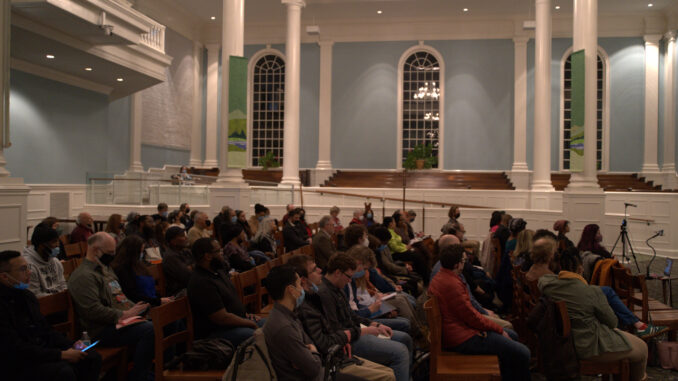
Zach Petroff | Opinions Editor
Jan. 26, 2023
For 25 years, activists from the Pittsburgh area have come together to hold a Racial Justice Summit (RJS) during the week of Martin Luther King Jr. ‘s birthday.
Activists and members of the community came together Friday and Saturday at the Pittsburgh Theological Seminary in East Liberty. The events included keynote speakers, workshops, discussions, wellness sessions and a community resource room.
This year’s summit centered around honoring the past while building for a strong future.
The RJS began in 1998 after frustrations built over the death of Jonny Gammage, a young Black man whose life was ended by the Pittsburgh and Brentwood police in 1995. His death was ruled a homicide by the Allegheny County coroner.
All of the officers charged were either granted a mistrial or acquitted.
“The Racial Justice Summit was one of the most important outcomes of that tragedy,” said Tim Stevens, founder of the summit. “Including, on the positive side, the awarding of scholarships every year to Black law students who have a commitment to deal with civil human rights and social justice.”
Friday night kicked off with the Keynote panelist which consisted of Auja Diggs, an executive member of Black, Young & Educated, a youth activism nonprofit, Amber Thompson, founder of de-bias, an equity-focused monitoring and evaluation platform, and Dr. Noble Maseru, the Associate Dean for Diversity and Inclusion at University of Pittsburgh.
The panelists, all hailing from different generations, spoke on their introduction to and involvement in activism. Each member contributed unique insights in to racial justice advocacy.
“Coming into social work, my background is in behavioral sociology and a master’s in organizational development,” Thompson said. “I understand the system. I understand the plugs in the system. But if I’m struggling, and I have an education, and I have support and I have resources. What is everyone else going through?”
After the keynote speakers finished giving their introductions, they led everyone in attendance in a roundtable discussion in which audience members could share their experiences and advice on equality.
In the second day of the RJS, 25 discussion group sessions were held on Saturday in the Pittsburgh Theological Seminary classrooms by various members of the community.
Each discussion was based on themes centered around the fight for equity for disenfranchised people.
Opening remarks on Saturday from Daeja Baker, lead summit organizer and coordinator, exemplified qualities of an equal society that are not yet apparent in our world.
“Equity is the right to go to work and be safe and not have to work 18-hours a day to feed your family,” Baker said. “Equity is being able to have access to healthcare in the same way that our counterparts have access. Equity is having access to unions that protect you from unfair practices in the workplace. Equity is not having our neighborhoods patrolled by the police at five times the rate as other neighborhoods.”
Workshops and wellness were also topics of discussion at the Saturday sessions. Events included “Building Solidarity, Making History,” “Capitalism Vs. Humanity Equals Racism” and “Putting Fair Housing Into Action.”
“I thought it was interesting here, the connective experience,” said Pitt student Natalie Davidson. “Of course with Black and Brown people, our experience with racial injustice is pretty known. As someone who looks like them, I am quite familiar with it, but it’s nice to hear about adding our correlations between the different areas that we exist in.”
A community resource room also offered opportunities for event-goers to learn about local advocacy groups involved in promoting a future of equality.
Representatives from the City of Pittsburgh’s Commission on Human Relations, Lawrenceville United, Young People in Recovery, Allies for Health and Wellbeing and Creative Reuse were in attendance. Trace Brewing, a brewers collaboration that offers a paid six-month-long program to women, BIPOC and LGTBQ+ individuals in the aspects of the brewing process in Bloomfield, was also available for interested visitors.
The six months of planning that were dedicated to this summit was apparent, as many diverse backgrounds were able to come together to work on equality and justice for all.
“We’re like a grassroots community organizing for mutual aid,” said Kevin Jarbo, RJS coordination lead. “We want to be able to bring all these different sorts of folks together and say, ‘these are the resources that are out there, these are the things, and these are the people who are doing the work.’”
Those that would like to volunteer for the next Racial Justice Summit can sign up at at https://www.pittsburghracialjusticesummit.org/.
